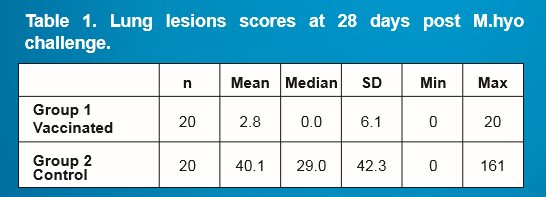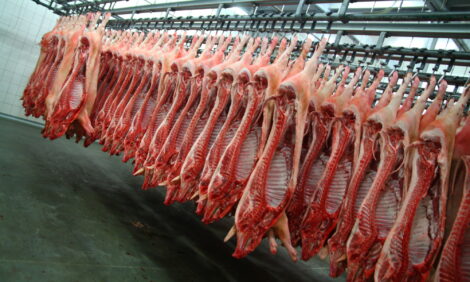



Duration of Immunity of Hyogen® in Fattening Pigs Against Mycoplasma Hyopneumoniae
Mycoplasma hyopneumoniae (M.hyo) is a major infectious agent in swine, it is of worldwide relevance, and responsible for persistent dry cough, retarded growth rate and reduced performance, write Miklós Tenk, Tamás Szalai, Marianna Ivók, Éric Brunier, Zoltán Nagy, Zoltán Rozsnyai and Zoltán Pénzes, Ceva.The objective of the study was to test the efficacy and duration of immunity of Hyogen® vaccine by M.hyo challenge at six months after vaccination.
Materials and Methods
Forty (40) 3-week old pigs, seronegative to M.hyo were randomly divided into two groups of twenty animals. In the first group (Group 1), pigs were vaccinated at 3 weeks of age with Hyogen® (2 ml I.M.), while in the second group (Group 2) the pigs were injected with PBS as a placebo (2 ml I.M.).
Both the vaccinated and the placebo-injected control groups were challenged at 181 days (~6 months) after vaccination with 2x108 CCU/animal dose of M.hyo strain L1. The challenge was repeated on the following day.
After a 28 day observation period the animals were euthanized, and the following parameters were collected: mortality and clinical signs, lung lesions (scored as described in the European Pharmacopoeia: 2448), humoral immune response (Oxoid ELISA kit) and cellular immune response (CMI, Porcine IFNγ ELISpot kit).
Histology (haematoxiline-eosin stain) and M.hyo-specific real time PCR were used to confirm the presence of M.hyo in the lung samples.
Results
Clinical signs and mortality. In general, in both groups the clinical signs observed during the post challenge period were very rare and light, therefore these data were not statistically analysed.
In the placebo-injected control group (Group 2) one animal died at 25 days post-challenge. The pathological examination confirmed M.hyo as the cause of the death.
Lung lesion scores Lung lesion were evaluated and scored according the European Pharmacopoeia at 28 days post M.hyo challenge (Table 1).
The challenge was valid, as high mean weighted lung scores (40.1) were obtained in the placebo-injected control group (Group 2).
The mean weighted lung lesion scores of the vaccinated group (Group 1) were significantly lower (2.8) (Wilcoxon ranksum test, p=0.0001). Histology and M.hyo-specific real time PCR were used to confirm that the lesions observed were due to M.hyo.
Serology. All study animals were seronegative at the time of vaccination. At 23 days post vaccination 80% of the vaccinated pigs (Group 1) became seropositive to M.hyo, and 70% of them remained seropositive till 181 days (~6 months) after vaccination. The placebo-injected control animals (Group 2) remained seronegative during the whole study.
CMI. The number of M.hyo-specific porcine IFNγ secreting cells was measured at 76 days post vaccination. The vaccinated group (Group 1) exhibited significantly higher number of M.hyo-specific IFNγ secreting cells (8.3 cells per 106 PBMC) compared to the control Group 2 (0.5 cells per 106 PBMC; p=0.0057).
Conclusions
Three-week-old pigs were vaccinated with Hyogen®, and the pigs were challenged with M.hyo at six months after vaccination.
At the end of the fattening period Hyogen® provided excellent protection, as the lung lesions scores of the vaccinated group were significantly lower compared to the placebo-injected control group.
In addition, in the vaccinated group high level of seropositivity to M.hyo, and significantly increased number of M.hyo-specific porcine IFNγ secreting cells were observed, indicating good vaccine take and strong cell mediated immunity.










